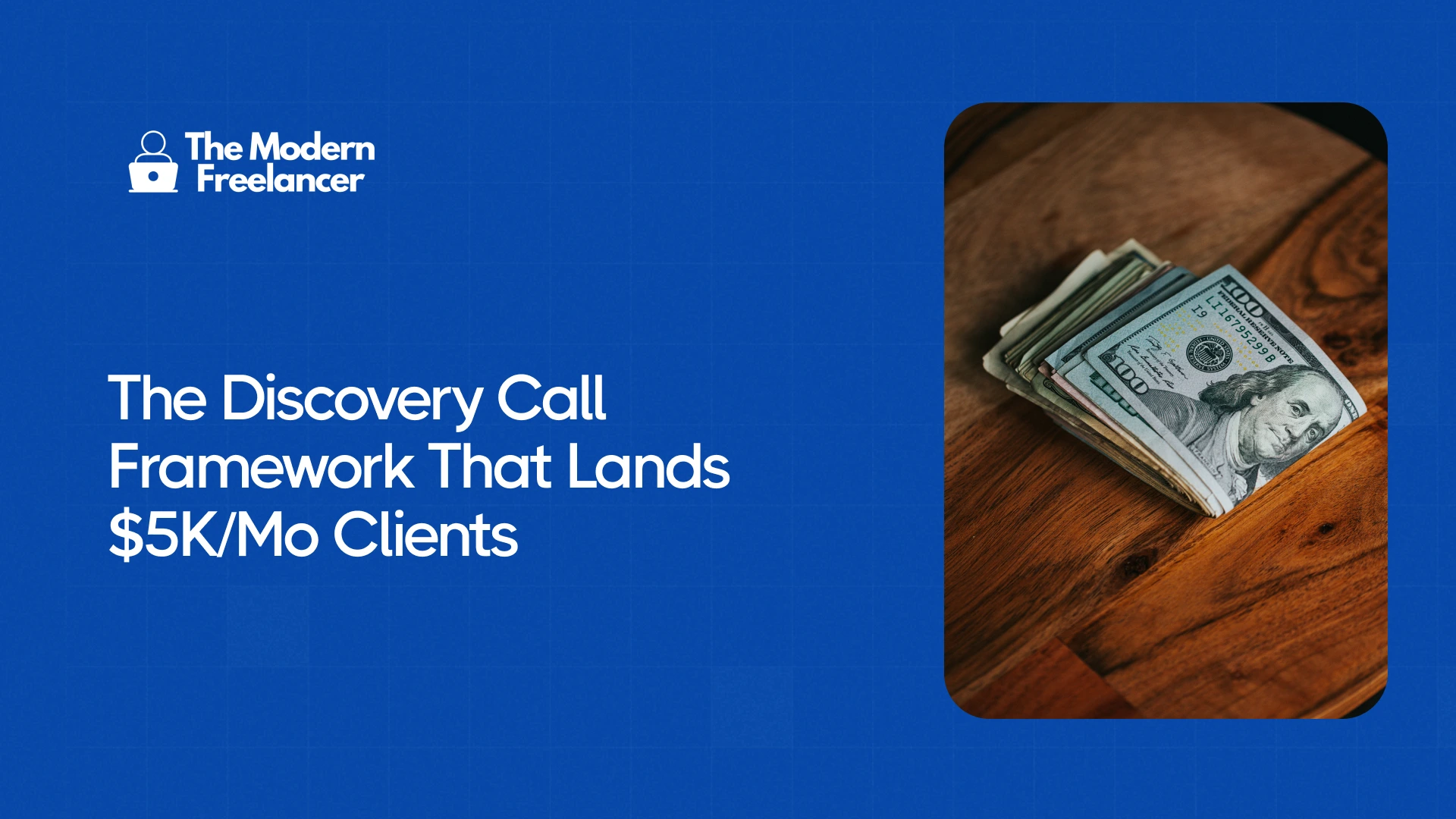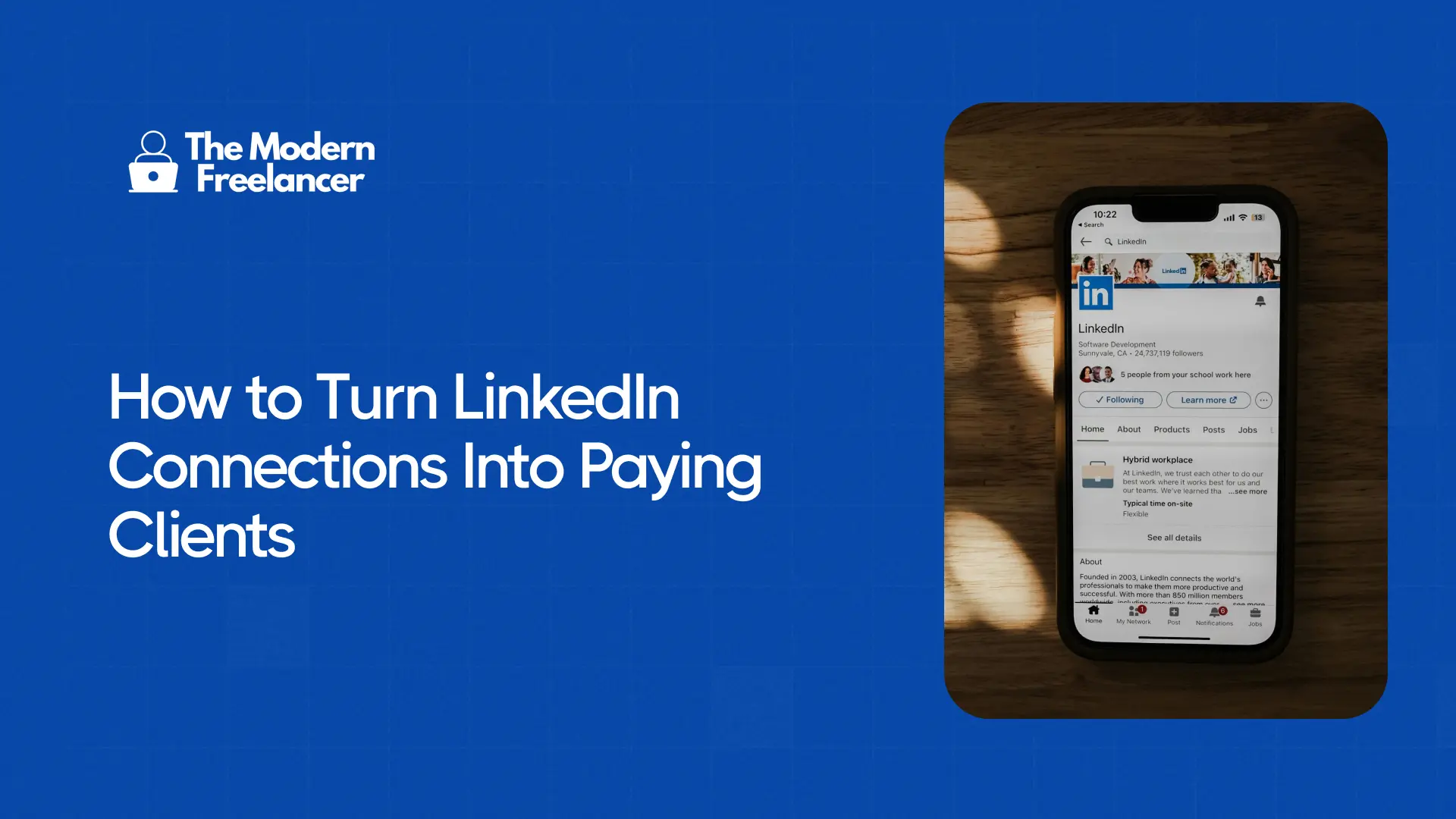The Discovery Call Framework That Lands $5K/Mo Clients
Master the discovery call framework with this proven discovery call checklist to land $5K/month clients and close deals with confidence.

Heads up: Some of the links below are affiliate links, which means I may earn a small commission if you choose to use them — at no extra cost to you. I only recommend tools I personally use and trust.
Every successful client relationship starts with a single conversation. Not the proposal, not the contract signing, but that first “discovery call”’.
It's where you set the foundation for everything that follows - your pricing, your scope, and most importantly, how your prospect views your value.
Yet most freelancers get this crucial first conversation completely wrong.
They jump straight into the weeds, talking about themselves or asking tactical questions like attribution settings or platform preferences. In doing so, they immediately position themselves as technicians rather than strategic partners.
Here's the truth: Clients don't hire freelancers because they know how to execute tasks. They hire freelancers because they believe those skills can solve a business problem.
The discovery call is your chance to uncover that problem.
What is a Discovery Call?
A discovery call is the first filter for mutual fit. It’s your first deliverable — a conversation made to diagnose problems, not to sell services. This is where you figure out whether the client actually has a problem you can solve and whether they’re the kind of person you want to solve it for.
A good discovery call feels more like a strategy session than an interview. When you master this kind of sales call, everything changes: close rates go up, average retainers grow, and client relationships last longer. The goal? To get your prospect talking about their pain points, metrics, and motivations. Meanwhile, you quietly map out how your expertise connects to their biggest goals.
If you do this right, they’ll leave the call thinking, “Wow, that was valuable.” And that’s exactly what builds momentum for a $5K retainer.
Why is a Discovery Call So Important?
The discovery call is qualifying whether you should work together at all. This single conversation determines:
- How much they’ll trust you
- How much they’ll pay you
- How long they’ll stay with you
It’s where you prove you’re not another freelancer chasing invoices but a strategic partner who understands the business game.
When you master this skill, everything changes. Close rates go up because your value becomes obvious, projects get bigger because clients see ROI, not deliverables. These retainers last longer because you solve real problems.
Mastering the discovery call is what separates the $500 hustlers from the $5K professionals.
When you shift from asking "What's your current setup?" to "What's preventing you from hitting your CAC and ROAS goals?", something fundamental changes. The conversation elevates from project specifications to business impact.
This shift in approach doesn't just lead to better client relationships - it transforms your entire business. Higher close rates. Larger project values. Long-term retainers.
Because when you truly understand what drives a business decision, you can align your services with real value, not just deliverables.
Now, let’s talk about how to prepare for a discovery call.
Discovery Call Checklist: Setting the Stage for Success
The most impactful discovery calls start before you even say "hello." But let's be clear - this isn't about spending hours stalking LinkedIn profiles. It's about smart preparation that positions you as someone who values their time.
Before any call, you need to understand:
- What prompted them to seek help now
- Their definition of success (in business terms)
- The real cost of not solving their problem
- Key stakeholders in the decision-making process
- Timeline drivers and market pressures
The easiest way to do this is with a 15 minute research sprint:
- Go through their website's main products and read reviews
- Scan their facebook ad library to understand their current marketing message
- Identify 2-3 key competitors
- Do some quick research on company news or PR features
- Check any mutual connections with the POC
You're not trying to become an expert in their business. You're looking for conversation bridges and potential pain points. This background gives you context for asking smarter questions, not for showing off how much you know about them.
Now, let’s talk about the kind of questions you need to ask during a discovery call
Discovery Call Questions That Uncover Real Value
The first 15 minutes of your call signal whether you're a tactical executor or a strategic partner. Here's how to be the latter:
1. Understanding the 'Why'
"What prompted you to look for help now?"
Simple but powerful. When they say "We need a new agency to manage our Facebook ads," this reveals the real story that perhaps their CAC increased by 30% last quarter.
2. Uncovering Business Context
"Walk me through who handles these responsibilities now..."
Better than "What's your current process?" This reveals:
- Team structure and capabilities
- Internal and external bottlenecks
- Brand creative requirements
- Potential resistance points
3. Future Vision & Success Metrics
"When we look back in 12 months, how will you know this investment paid off?"
Notice we're not asking about "goals." We're talking business returns:
- Revenue targets
- Market share goals
- Efficiency metrics
- Competitive advantages
"What other initiatives might this impact?"
This is how $5K projects become $50K retainers. Listen for:
- Connected problems you can solve
- Future roadmap items
- Strategic partnership opportunities
- Natural upsell moments
4. Moving Beyond Budget
Instead of asking "What's your budget?" focus on establishing value first:
"Where do you see your biggest growth opportunity right now?"
This opens doors to discuss:
- Market expansion plans
- New product launches.
- Testing new channels
- Competitive pressures
- Revenue potential
"What have you tried before?"
This reveals:
- Past investments (budget context)
- What didn't work (your opportunity)
- Internal capabilities (scope guidance)
- Pain points (value proposition)
5. Timeline & Investment
"What's driving your timeline on this?"
Better than "When do you need it?" You'll uncover:
- Market pressures
- Competitor moves
- Internal deadlines
- Budget cycles
This lets you forecast delivery and set realistic expectations — all key parts of a scalable retention framework.
Pro Tip: Let them talk. The more they share about their business challenges, the more opportunities you'll spot to expand scope naturally.
My 3-Step Discovery Call Framework
The discovery call isn't complete until you've established clear next steps. Here's how to close professionally and maintain control of the process.
1. The Strategic Recap
Always start by recapping everything you discussed and learned.
"Let me summarize what I've heard to make sure we're aligned..."
And then mention:
- Their key business challenges
- Specific outcomes they need
- Timeline drivers
- Success metrics
- Key stakeholders
2. The Action Plan
Instead of the vague "I'll send a proposal," be specific:
"Based on our discussion, here's what I recommend as next steps:
- I'll draft a strategic overview by [specific date]
- You'll review it with [key stakeholder]
- We'll reconnect on [specific date/time] to refine the approach
- Proposed start date by [date]"
"While I develop the strategic overview, what other information would help you and [stakeholder name] make a confident decision?"
3. The 24-Hour Follow-Up:
Now, within 24 hours, make sure to follow up with the following to keep the momentum going:
- Meeting summary
- Agreed next steps
- Any promised resources
- Calendar invite for next discussion
- One valuable insight they didn't ask for
More Tips for How to Run a Discovery Call
Let’s get tactical. Once you’ve nailed the structure, the way you run the discovery call determines whether a prospect walks away thinking, “That was helpful,” or “That was next level.” These small shifts make a big difference.
Start with energy
The tone you set in the first 30 seconds defines the entire conversation. Smile (yes, even if it’s a Zoom call) and sound like someone who actually enjoys what they do.
Set expectations upfront
A simple “Here’s how I like to run these calls…” instantly puts you in control. It shows you’ve done this before and gives structure to the conversation.
Listen 70%, talk 30%
The more your prospect talks, the more gold you uncover. Think of yourself as a journalist uncovering the “why” behind their goals. Ask open-ended questions, take notes, and resist the urge to jump in with solutions too early.
Share micro-insights throughout
You don’t need to give away full strategies, but small observations (“That messaging sounds more B2B than consumer-facing, has that been intentional?”) demonstrate expertise without pitching. It turns the call into a collaboration.
End with clarity
Every discovery call should end with both sides knowing exactly what happens next. Summarize key takeaways, outline next steps, and confirm a date for follow-up. Uncertainty kills deals faster than bad timing.
Your goal isn’t to sell but to diagnose, clarify, and lead. The best discovery calls feel less like a pitch and more like a strategy session. And when you run them that way, the selling takes care of itself.
Implementing This Discovery Call Framework Into Your Current Process
As you can see, the difference between $500 projects and $5K retainers isn't just skill—it's how you conduct discovery.
So before your next call, make sure you do the following:
- Pick 3 business-focused questions from each section
- Write them down (seriously, write them)
- Practice asking them naturally without sounding scripted
- Prepare follow-ups for common questions
Remember: Your discovery call isn't an interview—it's your first deliverable. When you help prospects think deeper about their challenges, you've already provided value.
The questions you ask set the tone: Are you a vendor they'll manage, or a strategic partner they'll invest in?
Your Action Steps
- Save this framework
- Use it as your call checklist
- Track which questions get the best responses
- Refine your approach
The best clients aren't looking for another pair of hands. They're looking for someone who understands their business. These questions prove you're that person.



.webp)